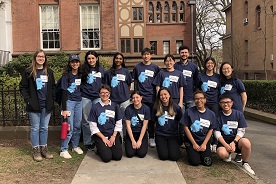
The students of MB&B 365, Biochemistry and Our Changing Climate, published an article, “Five Questions on How Biochemistry Can Combat Climate Change,” in BBA Advances. This article is part of a new BBA Advances series called Five Burning Questions meant to give researchers a platform to bring attention to specific topics in a concise way that brings scientists and early career researchers up to speed on the issue.
The course, taught by MB&B’s Karla Neugebauer, PhD, and teaching fellow Morgan Shine, explored how the issue of climate change affects and can be addressed by biochemistry. The course was a mixture of lectures and student discussion around a specific climate issue highlighted each week. The students, guided by Dr. Neugebauer and Shine, wrote an article on the issues they explored in the course.
The article starts with an introduction by Diane Documet and Cathleen Liang where they set the stage by highlighting the notable lack of snow last year in New Haven due to La Niña and the effects of global warming. Along with introducing other impacts of climate change, Documet and Liang emphasize the need for new approaches to address climate change, especially approaches that involve biochemistry.
The article then dives into the questions as follows:
Question 1: What molecular mechanisms protect cells from changes in pH, salt, and temperature?
Kenneth How and Deborah Arul address this question by examining how changes in pH, salt, and temperature can affect cellular mechanisms including coral bleaching and turtle sex determination. They also explore how extremophiles can adapt to their harsh environments and how we can take inspiration from those organisms to bioengineer biological solutions to issues caused by climate change.
Question 2: How can biochemistry help achieve carbon drawdown?
Lilijana Oliver and Katherine Moon focus on bioengineering crops and carbon sequestration in their solutions to this question. They focus on carbon sequestration via photosynthetic pathways and suggest applying the carbon capturing capabilities of C4 plants to decrease atmospheric carbon (CO2).
Question 3: How can protein engineering contribute to renewable materials?
This question was addressed by Yaya Guo and Sasha Wood exploring the potential of protein engineering in creating renewable materials. They focused on both creating new biodegradable plastics that are less of a detrimental to the environment and creating enzymes to recycle plastics we currently use like PET.
Question 4: How can the biochemical basis of taste inform the development of alternatives to meat?
Emely Lopez Fajardo and Miriam Kopyto tackle this interesting question by focusing on advances in the development of meat alternatives. They hone in on the biochemical aspect of taste and the biochemical ways to mimic meat flavoring, digestibility, and allergenicity concerns.
Question 5: What molecular mechanisms impact zoonotic disease therapeutics?
This question was addressed by Kevin Chen and Arianny Acosta with a focus on the role of biochemistry in the understanding and control of zoonotic diseases. They not only dive into the biochemistry of pathogens themselves, but also explore the biochemistry of the non-human hosts of these diseases to approach the issues from multiple perspectives.
Morgan Shine and Dr. Neugebauer conclude the article by stressing the importance of tackling climate change through education across all disciplines and provide some examples on how to incorporate climate change into various classes. They call for a holistic approach to preserving human and planetary health–the “One Health” concept. In a resounding call to action for academics, the authors state that “In today’s world, we believe demonstrating that the academy knows about and feels relevant to climate change is especially critical for maintaining the importance of higher education and, indeed, the importance of universities.”
Read the article here: Five questions on how biochemistry can combat climate change
Shravani Balaji